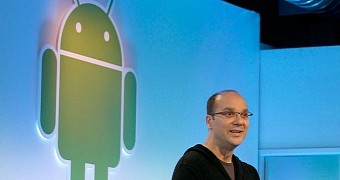Andy Rubin is the co-founder of Android Inc., which was sold to Google in 2005. He oversaw Android development at Google until 2014, when he started managing the robotics division. After working nine years at Google, he left the company in 2014 and started an incubator for hardware startups, called Playground Global.
As it turns out, Andy Rubin has started working on a new smartphone, and Bloomberg reports today that he’s preparing to launch a new company, called Essential Products Inc. Apparently, he already recruited a team of 40 people from Apple Inc. and Google to work at the platform company that’s designed to tie multiple devices together.
“Essential is working on a suite of consumer hardware products, including ones for the mobile and smart home markets,” the report mentions. The main project at the company will be a high-end smartphone with edge-to-edge display that lacks a surrounding bezel. During CES 2017, Rubin discussed the new smartphones with executives from multiple US carriers, including from Sprint.
Rubin already registered the company with the US Patent and Trademark Office, mentioning that Essential’s goods and services will include smartphones, tablets, accessories and operating software for mobile phones, but it’s unclear if the devices will run Android.
Display larger than 5.5 inches, ceramic back and metal edges
Rubin’s smartphone will essentially be built out of premium materials and have a modular design, seeing how there’s demand on the market for such devices. However, Lenovo’s Moto Z series with semi-modular features recorded relatively satisfactory sales, but LG’s G5 failed to capture the attention of the market.
Rubin’s premium phone will be competing against Google’s Pixel and Apple’s iPhone, while it is also expected to feature AI machine learning. Apparently, Foxconn will be the company to manufacture the new phone and at least one prototype of this new device has a screen larger than that of iPhone 7 Plus's display, 5.5 inches.
It seems that Rubin’s company is testing ways to allow the screen to detect different levels of pressure and working on a proprietary connector that would charge the battery and enhance functionality. Hardware accessories could be added, like a sphere camera for high-resolution 360 degree photos.
The phone would also have metal edges and a ceramic back. It’s expected to hit the market in the middle of this year for a price similar to the iPhone 7.

 14 DAY TRIAL //
14 DAY TRIAL //